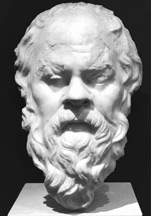Finding the archetypal voice of philosophy
 There have been numerous philosophers since the fifth century BC.
They tried to interpret and define the meaning of life and various other
issues connected with it. Some of their theories are not easy to
understand. Most of the time there are many disagreements among them. To
borrow a conceit from Soren Kierkegaard, there is no final conclusion
about the nature of philosophy. There have been numerous philosophers since the fifth century BC.
They tried to interpret and define the meaning of life and various other
issues connected with it. Some of their theories are not easy to
understand. Most of the time there are many disagreements among them. To
borrow a conceit from Soren Kierkegaard, there is no final conclusion
about the nature of philosophy.
In the welter of eastern and western philosophy, philosophers have
argued about particular issues and “meta-issues” without coming to any
conclusion. As discussed in these columns, 20th century philosophers
have begun to accuse others who lived in the past calling them
non-philosophers. Although disagreements are common in any field of
study, accusing each other of not being philosophers is mind boggling.
Today existentialists condemn idealists and post-modernists have no
regard for the former. Analytical philosophers do not see eye to eye
with Continental philosophers. It is strange but true that some
philosophers have even questioned the very foundation of philosophy. In
an address to the American Philosophy Association, Kai Nielsen said,
“There is no defending the tradition. Systematic analytic philosophy and
its Continental cousins along with their historical ancestors must be
given up.”
Quest
Such extremist views may baffle even those who wish to study
philosophy. For instance, Ven Baddegama Samitha Thera, an avid reader of
philosophy, said nothing would stop him in his quest for truth,
knowledge and meaning of life. For such people who are exploring the web
of knowledge, most philosophers are of little help. Petty squabbling
among philosophers has led to more confusion than harmony.
|

Socrates:
The wisest man who ever lived on this planet. |
One reason for this uncertainty in philosophical views is the immense
faith in science and technology. Human life has been reduced to
biochemistry. Maybe some philosophers have been trying to define
abstract issues scientifically. Specialised techniques used in science
may not work properly in philosophy. How can anyone define the meaning
of life or man’s place in the universe scientifically?
Ludwig Wittgenstein and Martin Heidegger were aware of the 20th
century crisis in philosophy. In fact, they tried to save philosophy
using prophetic and poetic words at times. Whether Wittgenstein or
Heidegger would stand the test of time is another matter. But we should
be thankful to them for their attempt to find the archetypal voice of
philosophy. At times, even if they sound nonsensical, we must remember
that they are telling us something important. If you care for such
issues then you are on your way to become at least a wayside
philosopher.
Myth
The myth that philosophy is only for brilliant and eccentric thinkers
has been exploded. Most of us are potential thinkers in our own right.
Haven’t we wondered what life and the universe mean to us? We are not
sure whether there is life after death despite religious teachings.
Although we are not philosophers per se, humans are inquisitive
creatures. We are also intellectually equipped to reason why certain
things occur. Although we do not realise it, most of the time we think
philosophically.
Philosophy does not expect us to find answers to all the pressing
problems in life. What matters is the process of finding the answers.
Our method of approach may not be sophisticated. While philosophers
discuss their theories, we share our views with friends and relatives.
Great philosophers such as Socrates, Plato and Aristotle encouraged
their students to disagree with what they taught. If we can do the same
with our listeners and readers, we are on our way to become thinkers.
If anybody wishes to have a role model to be a thinker, the best
archetypal philosopher is Socrates. He did not commit his philosophy to
writing. He also did not come out with sophisticated ideas. He is
perhaps the wisest man who ever lived on earth because he said that he
did not know anything. If one philosopher disagrees with another, we
should not think that philosophy has come to a dead end. On the
contrary, such disagreements provoke more discussion and generate fresh
ideas.
|

